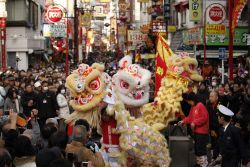
April 7, 2011
Bama Lohas Café
Ginza buzzes with a restaurant specializing in hemp cuisine
By Metropolis
Originally published on metropolis.co.jp on April 2011


Hemp cuisine? In Tokyo? Ginza, no less? Of course our interest was piqued. It was only a recent visit to Bama Lohas Café for dinner that set the record straight.
Targeting the burgeoning LOHAS demographic, ladies who lunch, and Ginza’s increasing influx of Chinese tourists, Bama’s menu centers around a form of “fructus cannabis.” This plant is popular in China’s Bama Yao Autonomous County which, according to the restaurant’s PR, is famous for both aiding longevity and improving overall health. It’s fitting given the restaurant’s LOHAS heritage—a partnership between local publisher Sotokoto and a Chinese company with its roots in the Guangxi Zhuang Autonomous Region.
The LOHAS theme is carried through to the interiors, with no dragons, Buddhas or lanterns in sight. Instead, bare timber and ethereal lighting are key, and the bustling open kitchen is the only counterpoint to architect Kengo Kuma’s contemplative naturalism.
But back to the hemp and the food. Operating from breakfast through dinner, Bama Café offers a menu ranging from congee drizzled with hemp oil to dim sum to char siu rubbed in “special salt.” The drinks list features a wide assortment of Chinese teas and herbal tonics but, for those less health-minded among us, beer, wine—sadly, only “house” available by the glass (¥700)—and spirits make a welcome appearance.
We start with a Kirin Heartland and Kamedashi shaoxing rice wine (both ¥600), along with items from the tapas and dim sum lists. The asparagus with hemp-salt parmigiano (¥800) arrives first, a fluffy mound of cheese smothering the slender spears. It works, but the dim sum (most run ¥500 for two pieces) are infinitely better. The fragrant and springy shumai with prawn, squid and scallop offers a divine taste of the sea, while the xiaolongbao “soup” dumplings are little volcanic gems.
Hemp pickles (¥500) are more plainly coined yet taste anything but. Drizzled with a vinegar-hemp oil emulsion, the carrot, cucumber and daikon batons are perfect palate cleansers and timed perfectly before an appetizer of steamed chicken (¥1,600). Dressed with hemp oil, welsh onion, ginger and a spicy sesame sauce, this is an outstanding Hainan-style dish that gives in at the first sight of cutlery.
Although its ingredients can’t be faulted, the subsequent shrimp, char siu and squid yakisoba (¥1,600) is more pedestrian. Similarly, the brackish hemp tofu and vegetables braised in a Staub (¥1,500) needs a side of steamed rice to be fully appreciated. None is available. Instead, we opt for a very palatable wagyu and sautéed greens fried rice with optional garlic (¥2,000). It’s moreish and just one of the many cha-han versions on offer.
Desserts are a Bama strong point, with the junket-like mango pudding (¥700) and almond pudding dressed with hemp, honey and sesame (¥600) a cut above those usually found at Chinese restaurants. Subtle and restrained, they prove a fitting finish to our meal.







